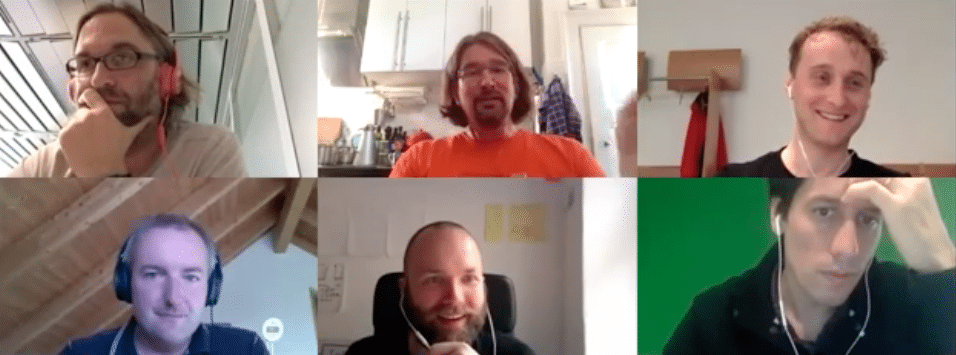
This blogpost is focused on my own CTC/CEC application specific learnings from the Certified Team Coach (CTC) Mentoring Pilot Program. You may also want to check out these:
Posts in the Certified Team Coach (CTC) series:
- CTC Mentoring Pilot: Overview
- CTC Mentoring Pilot: Application specific learnings
- CTC Mentoring Pilot: Coaching (To be written, tweet me if you want to be notified.)
- CTC Application Process Tips by Roger Brown
- CTC Quick pointers for candidates by Vernon Stinebaker
- CTC Application Insights by Nils Bernert
Questions we worked with
The questions we worked with (see below) were extracted from the Sample CTC Application Form v. 16125. The sample form can be download from the Scrum Alliance website here. As a plan b, you can also find a local copy of v. 16125 here). For your own application, be sure to obtain the latest version directly from the Scrum Alliance.
We worked on part two of the application, which contains a total of 12 questions about Agile Knowledge and Coaching Competency which are to be answered using up to 600 words each. Out of this pool, we focused on the following three questions:
Agile Knowledge 3: Team Challenges
Identify two team formation and development challenges commonly encountered while introducing Scrum. For each, describe a coaching approach to address the challenge.
Coaching Competency 1: Facilitate
List three (3) facilitation tools that you use to help teams and other organization members discover opportunities for improvement. Emphasize large-group facilitation experiences. For each, describe a situation in which you used it effectively or in which it did not achieve the desired results.
Coaching Competency 3: Balance
In your own words, briefly explain the difference between coaching and consulting. Describe how you developed your competency to balance coaching and consulting. Describe an experience in which you felt “out of balance.” How has your approach changed because of this experience?
My learnings from answering and feeback
All coaches participating in the mentoring were invited to write an answer to one of the first two questions (listed above) and share them with the group. During the following sessions, each coach had a chance to verbally summarise his answer and receive feedback from the group and mentors. For the last session, I chose to prepare an answer for an additional question and chose question number 3 (listed above).
Here is what stood out for me in our mentors’ and group’s feedback:
- This may sound obvious, but apparently many applicants did not do this: Read the instructions and questions very carefully. Read them again. Then read them again while you’re writing. Ask somebody for feedback before sending in the application. Check before asking for feedback that your writing actually matches the question.
- Be specific, tell the story of a specific challenging (potentially failing) situation. Let us understand your learning.
- Failing and making sense of it is cool.
- We are more interested in you in that situation than in the situation itself. More specifically: The questions are not about the situation, they are about you in that situation!
- Reviewers are interested in your thinking in the context of the respective situation, and even more in your thinking about your thinking.
- Share how you notice something, internally step back, make choices and observe how they land.
- One mentor differentiated between level 1 learning (actions, tools, techniques) and level 2 learning (changing the way you see the problem so that it allows you to see new options and tools) and pointed out that he would like to see level 2 learning documented in CEC applications (this also applies to CTC applications).
- Make the connection between your own internal learning and change of perspective and a learning of the person / group you are coaching.
- When generalising, refer to models and frameworks.
- How to get to 600 words? Leave out the context or reduce in to a bare minimum, go only into the details we need to understand your thinking.
- Applications are reviewed by at least 2 reviewers and there can be three types of results: They can be accepted, rejected or the applicant can be invited for an interview via a video call. Many applications are rejected. It is very rare (~10 %) that applications are accepted directly. Most applications are only accepted after some questions have been clarified via a video interview.
Our mentors pointed out that their own opinion is not necessarily identical with the opinions of all other reviewers and / or the Scrum Alliance. I acknowledge this. I now have much deeper knowledge about what is expected from CTC candidates and I am very thankful for that. Thank you to our Mentors Olaf and Martin and to Anton and all other coaches who participated in the program.
Posts in the Certified Team Coach (CTC) series:
- CTC Mentoring Pilot: Overview
- CTC Mentoring Pilot: Application specific learnings
- CTC Mentoring Pilot: Coaching (To be written, tweet me if you want to be notified.)
- CTC Application Process Tips by Roger Brown
- CTC Quick pointers for candidates by Vernon Stinebaker
- CTC Application Insights by Nils Bernert